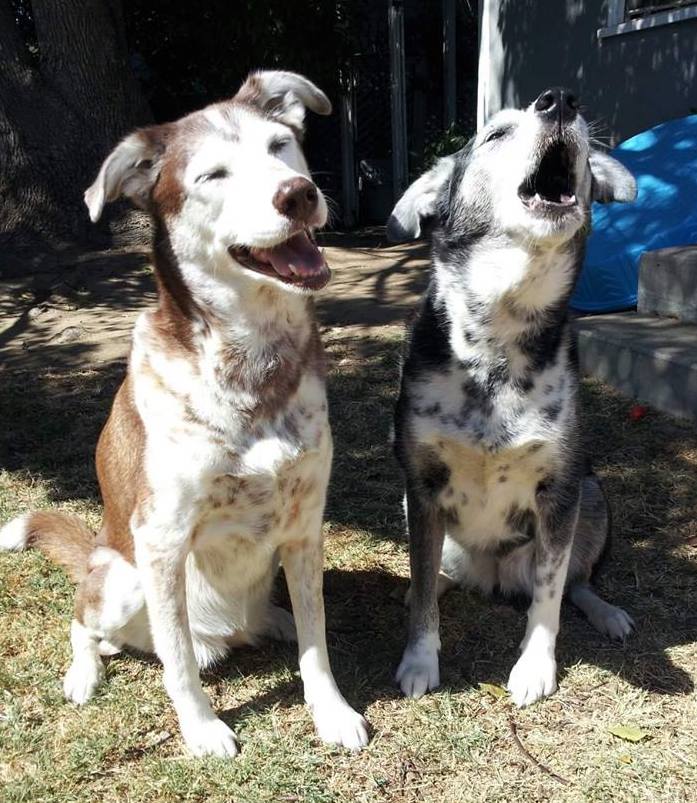
Barking—when it’s your neighbors’ dogs, not yours, doing the barking—what works and what doesn’t to improve the situation, to reduce the barking of dogs that are not yours?
You live near other people, so chances are you live near other people’s pets. Your neighbors’ barking dogs may be across the road, in the yard next door, or in the apartment on the other side of a wall. You may have dogs of your own. That may exacerbate the barking problems you’re having with your neighbors’ dogs . . . or not. Your own dogs may not be barkers at all. If they are, you’re probably fully aware of how their barking can set off answering barks from your neighbors’ pets. You may be far more tolerant of your neighbors’ dogs’ barking if your dogs bark, too, or you may blame the other dogs for your own pets’ loud retorts. (It’s possible your neighbors feel the same about your dogs.)
You want less barking—from your neighbors’ dogs and possibly from your own dogs, too.
I asked dog owners and dog professionals for their suggestions on solving barking problems when the barkers are primarily your neighbors’ dogs, not yours. They described some typical situations.
Tara Williamson (Washington) I have a neighbor with multiple pups who live outside and talk non-stop. [Visitors to my house] often mention it, [but] I don’t tune into them any more. When I do, I just feel bad for them never getting to go in and be with their people.
Cheri A. Moore (Washington) If my neighbors’ dogs are barking, odds are good that some kid—usually a teen—is teasing them. The other time I hear them is if something, in the [dogs’] minds at least, is threatening the children who live there.
Christine Hale Vertucci (Illinois) I wish I had the answer as to what to do. I finally live in a great neighborhood where everyone has large yards and my dogs can enjoy time in the yard or on quiet walks on non-crowded sidewalks. Sounds perfect, right? Not when three neighbors on my block leave their dogs out to bark early in the morning before I get up—usually because it first wakes up my dogs, causing them to bark. I no longer need an alarm clock because the neighbors’ dogs make sure I’m awake early. One household even lets their three dogs out in the front yard to bark at everyone walking by, with or without dogs. I’ve tried passive-aggressively showing my displeasure about their barking dogs, but it hasn’t helped. I’d add that I am very careful to never let my dogs engage in this behavior. Most of my neighbors probably don’t even know we have two large dogs, unless they’ve seen us out walking.
Darcey Byrne (Washington) Alas, these are the scenarios:
▪ Animals left alone for too long, nothing to do, no play time, no exercise time, and sadly no schedule
▪ Animals that now have a dog door and come outside anytime, barking their heads off
▪ Other animals in our neighborhood can be heard singing the country-western version of “My people done left me and I’m so sad I gotta cry all day and night.”
Many, many neighbors we have had here (in my observations) seem to be missing the dog owner handbook—the one that emphasizes daily care to include exercise and play, lots of interactions, and an enriching space to be.

Photo by Shannon Thier
Talking With the Neighbors
What works? What doesn’t? What do you say? What do you suggest?
Toni Vignogna (California) The neighbors behind me have two large, barking dogs. I handled it the cowardly way by printing out several articles on separation anxiety and including two KONGs with recipes for stuffing them. I attached a note telling them, “In case you’re not aware of it, your dogs bark constantly when you’re gone. I hope this will help.” They now keep the dogs inside, but you can still hear them bark. Animal Control says they can do nothing if the dogs are inside. I can’t tune them out when my windows are open.
Summer Storm Kingery DVM (North Carolina) If it’s direct neighbors, I talk to them to see if they will let me intervene with enrichment and trainer recommendations. If [barking is] the dogs’ only entertainment, I can’t really blame them.
Ann McQuillen (California) I find frequently that barking next door is done by bored dogs or owners who just gave up because they don’t know what to do. I suggest my students visit the neighbors and invite them to class to see what can be done. We get lots of students that way and, along the way, cut the barking because the dogs are no longer bored.
Gail Jackson (Missouri) We have new neighbors who leave their dogs out most of the time. They were gone one night and the neighbor behind us showed up on our doorstep at 11 p.m. telling me to bring in my dogs. I told her it was the neighbors’ dogs (as they stood at the fence barking). She talked to the [neighbor] the next day and he came over and talked to my husband. We make sure if our dogs are barking, we bring them right in the house, and we’re working on teaching them to not bark at the fence. The neighbors now bring their dogs in more often, but it has been cold. Not sure what will happen with warmer weather.
Calling the Authorities
Calling animal control is another option. What can animal control do? What can’t they do? That depends entirely on where you live and how your town or county deals with animal control. Every jurisdiction is different.
You can look up local rules and regulations online, then direct specific questions, by phone or via email, to the appropriate local office. Ideally, the local agency for animal control will have staff available to make “courtesy” visits to residents whose dogs have been complained about, to inform the dogs’ owners that there have been complaints without revealing the identity of those who complained. But don’t assume your complaint will remain anonymous: ask.
Darcey Byrne (Washington) Next-door neighbors had three dogs that acted out as soon as the owners left the house. I did talk to the guy and, instead of hearing that the dogs barked, he told his girlfriend [that] we didn’t like his dogs. Animal control was called and for a while the [neighbors] were better with increasing the dogs’ exercise. But never did they understand that the dogs had serious separation issues.
One dog professional has some experience with neighbors who call the cops on barking dogs. If your complaint is about a barking dog only as an annoyance, not as an indicator of a possible crime, then calling your local police department is probably not a constructive choice.
Amy Suggars (Ohio) Someone in my neighborhood calls the police whenever a dog is barking. That option doesn’t seem to work!
Technology
What about options that don’t involve calling animal control or talking with your neighbors? I asked if anyone had experience with technology that deterred barking from a distance. Did it work?
Laura Bourhenne (California) One of my clients hung an ultrasonic anti-bark machine near the fence where the neighbor dogs barked. It worked, at least as long as we were working together, though I find that many dogs become desensitized to them after a while.
Sue Phillips (Nevada) I used an ultrasonic anti-bark machine that worked great on yappy dogs on the other side of my wall.
Patty Cable Groenen (Washington) When we got our labradoodle, we tried really hard to keep her barking under control. I realized we weren’t doing a great job when I saw my sweet neighbor had installed one of those sonic bark devices facing our deck. Oops.
Neighborhood Watch
Don’t discount completely the possibility that your neighbors’ barking dogs contribute to the “information” you receive about what’s happening in your neighborhood. Some of it may be meaningful!
September B. Morn (Washington) Living rurally, [I have] reactions to the neighbors’ dogs’ barking [that] are different than [they might be if I lived] in town. My neighbors live across the county road from me, and back about 100 feet from the road is where they kennel their dogs. So the dogs are about 200 feet away and through some trees and brush. I know those dogs’ various barks now—“Stranger!” or “Critter!” or “Friends are here!” or “DADDY’S HOME!!!”—and they let me know what’s happening on their side of our road.
Kim Campbell (British Columbia) When every neighbor without a dog was broken into (except my neighbor whose bichon was in the house alone), the cops told me a barking dog was the best crime deterrent. I was the one who discovered my neighbor’s house had been broken into, as I had gone over to let her dog out to potty, so it was me who called the cops. When they eventually arrived, one of them mentioned that, if there were barking dogs like “that place”—they pointed to my yard—there wouldn’t be a break-in. I laughed and said, “Yeah, that is my house.”
What About Your Own Dogs?
Do they react to the neighbor dogs’ barking? What is their reaction? What standard operating procedure with your own dogs have you established because the neighbor dogs are barkers? Is your management of your own dogs changing your neighbors’ dog/s barking?
▪ Visual barriers—solid wood or vinyl fencing, tarps on chain-link fences, hedges
▪ Tech devices—sonic bark deterrents that work automatically at some distance
These solutions could help stop excessive barking on both sides of your property line!
You’ll know if the changes you make to the dogs’ environment outside work by observing the behavior of your own dogs, and “listening” to the behavior of your neighbors’ dogs as well. Improvements may be in small increments, so pay attention. Count the number of barks in a certain time period, for example, then compare last week’s count to this week’s. Fewer barks, you may be on the right track; more barks, rethink and try something different. You won’t get instant success.
What Doesn’t Work? Yelling at Them
With your own dogs, the answer is teaching them an immediate happy recall (coming to you when called) from anywhere in the yard, no matter what they’re doing—even barking. When they come to you, reward them with their current favorite treat or toy, of course, then let them go out again immediately. They need to understand that a recall is not the end of the fun.
Your neighbors’ dogs may well perceive your yelling at them as a good thing. It’s attention, and they’re not getting attention anywhere else at the moment they’re barking. They may well stop for a moment to listen but then, almost inevitably, they will start barking again. Want a contest? Keep yelling. Want to do what works instead? Wait for a break in the barking and, quietly and calmly, praise the dogs verbally. “Good quiet!”
Do not throw food or toys at them. They are not your dogs; you do not have permission. What if they are allergic to the treat, or they choke on the toy? Quiet praise is what you’ve got. Permission to give anything to a neighbor’s dog must be obtained in person!
Management and Supervision of Your Own Dogs
▪ Don’t let your own dogs out if other dogs are out and barking.
▪ Don’t let your own dogs stay out if other dogs start barking.
▪ Do praise and reward your own dogs for not returning barks.
▪ Do praise and reward your own dogs for coming when called.
Kim Campbell (British Columbia) My neighbors have four dogs. Our dogs bark at each other. When I hear my dogs bark, I go bring them in, as do my neighbors with their dogs. The neighbor on the other side of me isn’t bothered by my dogs. (I often check in with him regarding that. His cat tends to spend a lot of time in my carport triggering my dogs.) The neighbor on the other side of the neighbors with four dogs has one dog and generally doesn’t hear my dogs. I have my back door open from the first hint of spring till it is too cold for me to bear it any more, so my dogs can usually go in and out when I am home. If they bark, I close them in the house using a baby gate. They are not allowed outside when I am not here.
I figure I don’t complain to people about their screaming, ky-ying kids, so they shouldn’t complain to me about a reasonable amount of barking. Not for hours on end, but a few minutes’ worth for me to hear it, get my shoes on, and go bring my dogs in.



